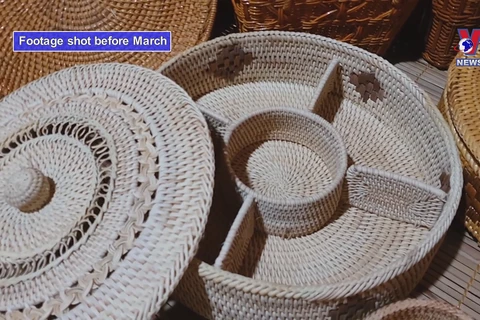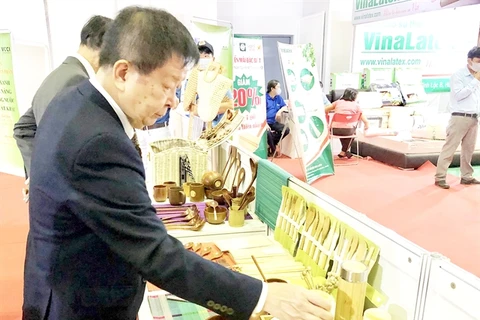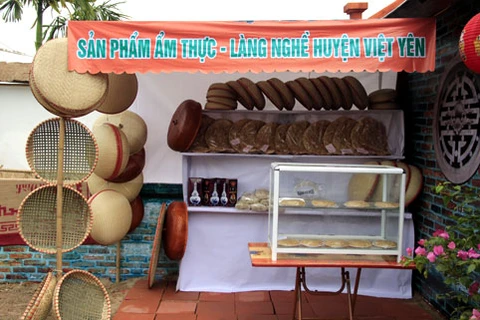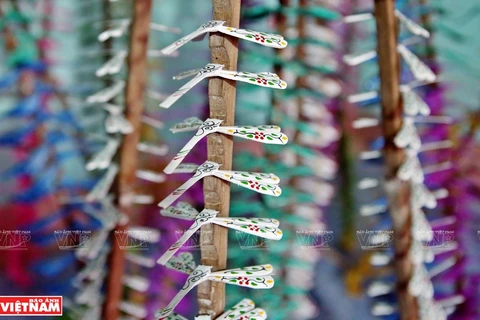Hanoi (VNA) – The Ministry of Agriculture and Rural Development (MARD) said at a seminar held in Hanoi on August 4 that it will work with other ministries and sectors to accelerate the early establishment of Vietnam bamboo association in a bid to develop the bamboo processing industry.
Co-organised by the MARD and the Vietnam Chamber of Commerce and Industry (VCCI), the event focused on the role of raw bamboo in the development of the value chain of Vietnamese bamboo products. Participants discussed the plant's role, position and value in Vietnam’s traditional culture, climate change response, and market mechanism.
Deputy Minister of Agriculture and Rural Development Tran Thanh Nam said bamboo trees bring about export value of about 300-400 million USD a year.
To develop the bamboo industry, he recommended businesses, together with local authorities, and producers, to build large areas of raw materials to meet production, processing and export requirements.
According to the MARD, Vietnam houses nearly 1.6 million ha of bamboos, producing 2.5-3 million tonnes of bamboo annually. The EU, the Republic of Korea, and Japan are the destinations for most of Vietnamese bamboo exports.
Nguyen Thi Thanh Huyen, coordinator of the EU-funded "Inclusive and Sustainable Clam and Bamboo Value Chains Development in Vietnam" project, said with a global market size that will reach approximately 83 billion USD by 2028, this will be a potential industry for Vietnam's agriculture.
According to the coordinator, bamboo products can replace natural wood and chemical compounds. Bamboo has earthquake-resistance capacity, and is able to prevent soil erosion, restore degraded soil, and absorb carbon, contributing to reducing the impact of climate change. It also plays an important role in the livelihoods of local farmers, as the plant is currently a source of raw material for over 600 bamboo and rattan craft villages.
Hoang Thi Yen, Deputy Director of the Department for Cooperatives and Rural Development, pointed out a series of shortcomings, including small, fragmented production, and a lack of legal standards and corridors for the cultivation, processing and use of bamboo materials in economic activities in Vietnam.
She underscored the need to preserve the cultural value of Vietnamese bamboo, promote economic values of and diversify bamboo products, and build concentrated plantations./.
Co-organised by the MARD and the Vietnam Chamber of Commerce and Industry (VCCI), the event focused on the role of raw bamboo in the development of the value chain of Vietnamese bamboo products. Participants discussed the plant's role, position and value in Vietnam’s traditional culture, climate change response, and market mechanism.
Deputy Minister of Agriculture and Rural Development Tran Thanh Nam said bamboo trees bring about export value of about 300-400 million USD a year.
To develop the bamboo industry, he recommended businesses, together with local authorities, and producers, to build large areas of raw materials to meet production, processing and export requirements.
According to the MARD, Vietnam houses nearly 1.6 million ha of bamboos, producing 2.5-3 million tonnes of bamboo annually. The EU, the Republic of Korea, and Japan are the destinations for most of Vietnamese bamboo exports.
Nguyen Thi Thanh Huyen, coordinator of the EU-funded "Inclusive and Sustainable Clam and Bamboo Value Chains Development in Vietnam" project, said with a global market size that will reach approximately 83 billion USD by 2028, this will be a potential industry for Vietnam's agriculture.
According to the coordinator, bamboo products can replace natural wood and chemical compounds. Bamboo has earthquake-resistance capacity, and is able to prevent soil erosion, restore degraded soil, and absorb carbon, contributing to reducing the impact of climate change. It also plays an important role in the livelihoods of local farmers, as the plant is currently a source of raw material for over 600 bamboo and rattan craft villages.
Hoang Thi Yen, Deputy Director of the Department for Cooperatives and Rural Development, pointed out a series of shortcomings, including small, fragmented production, and a lack of legal standards and corridors for the cultivation, processing and use of bamboo materials in economic activities in Vietnam.
She underscored the need to preserve the cultural value of Vietnamese bamboo, promote economic values of and diversify bamboo products, and build concentrated plantations./.
VNA
























